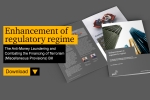Taxation
Browse through the latest updates in taxation
Corporate Tax
- Tax Residence
- Partial Exemption Regime
- Anti Abuse Rule
- Real Estate Investment Trusts (REITs)
- Accelerated Depreciation
- Taxation of Banks
- Additional Tax Deduction
- Carry Forward of Tax Losses
Tax Residence
A company will not be considered as tax resident in Mauritius if it is centrally managed and controlled outside of Mauritius
Partial Exemption Regime
80% partial exemption regime extended to cover companies engaged in:
leasing and provision of international fibre capacity
Reinsurance and reinsurance brokering
Sale, financing arrangement and asset management of aircraft and its spare parts, including aviation related advisory services
Income Tax Regulations 1996 (ITR) will be amended to address:
Detailed substance requirements for companies to benefit from the partial exemption regime.
Conditions to be satisfied for a company outsourcing its core income generating activities
The conditions for the outsourcing company will include:
Ability to demonstrate adequate monitoring of the outsourced activities
Conducting the outsourced activities in Mauritius
Not counting the economic substance of service providers multiple times by multiple companies when evidencing their own substance in Mauritius
Anti Abuse Rule
Controlled Foreign Company (CFC) rules will be introduced
Real Estate Investment Trusts (REITs)
New attractive tax regime will be introduced to promote the development of REITs
Accelerated Depreciation
Accelerated depreciation threshold raised from Rs30,000 to Rs60,000 for capital expenditure incurred on plant and machinery
Taxation of Banks
Levy expensed by banks under Value Added Tax (VAT) Act is not tax deductible for corporate tax purposes
Reduced tax rate of 5% applicable on the chargeable income of a bank in excess of its chargeable income in the base year, YOA 2017/2018, if the bank grants at least 5% of its new banking facilities to the following categories of businesses in Mauritius:
Small and Medium Enterprises (SMEs)
Enterprises engaged in agriculture,manufacturing, or production of renewable energy
Operators in African or Asian countries
Additional Tax Deduction
150% tax deduction of case filing fee from taxable income for parties attempting mediation, conciliation and arbitration
150% tax deduction on cleaning, renovation and embellishment works for hotels
Double deduction for expenditure incurred on fast charger for electric cars
Carry Forward of Tax Losses
Effective as from 1 July 2018, companies facing financial difficulty can carry forward unrelieved accumulated tax losses upon change in the ownership of the company, subject to meeting the conditions of the Minister
Personal Tax
- Exemptions and reliefs
- Tax credit
- Negative income tax / Special allowance
- Solidarity levy
Exemptions and reliefs
Deduction for a child pursuing tertiary studies extended to a maximum of 4 dependents
Relief of Rs10,000 for medical insurance premium paid for fourth dependent
Additional income tax exemption of Rs50,000 granted to retired or disabled persons having more than one dependent
Tax credit
Tax credit of 5% given at time of filing of return to employees earning net income below Rs700,000 annually to reduce tax rate to 10%
Employees with average cumulative emoluments below Rs53,845 in a month will be subject to 10% PAYE
Negative income tax / Special allowance
Household employers can pay NPF/NSF of their household employees either on a monthly basis or at the end of the year but they must submit quarterly statements to the MRA
All employers will be required to submit their returns electronically and pay via e-payment
Solidarity levy
Lump sum income received by a person as pension, death gratuity or compensation for death or injury will be excluded from the computation of Solidarity levy. This will be backdated to take effect as from 01 July 2017
It was clarified that solidarity levy will apply on an individual’s share of dividend in a societe or succession
Income Exemption Threshold
Effective as from income year starting on 01 July 2019
| Category | From (Rs) | To (Rs) | Increase (Rs) |
A. Individual with no dependent |
305,000 |
310,000 |
5,000 |
B. Individual with one dependent |
415,000 |
420,000 |
5,000 |
C. Individual with two dependents |
480,000 |
500,000 |
20,000 |
D. Individual with three dependents |
525,000 |
550,000 |
25,000 |
E. Individual with four or more dependents |
555,000 |
600,000 |
45,000 |
F. Retired/disabled person with no dependent |
355,000 |
360,000 |
5,000 |
G. Retired/disabled person with dependents |
465,000 |
470,000 |
5,000 |
Value Added Tax
- VAT Refund Scheme
- Removal of VAT
- Airline industry
- Zero-rated supplies
- VAT Exemption
- Special Levy on Banks
VAT Refund Scheme
Introduction of VAT refund scheme on accomodation costs for events of at least 100 foreign attendees over 3 nights
VAT refund scheme to planters/breeders extended to:
Greenhouse cooling pads;
Greenhouse fans;
Greenhouse growlights;
Agricultural dehumidifiers;
Hydroponic trough systems;
Vertical grow towers;
Dutch buckets/pots system;
Netcups and pots;
Plant support clips;
Meshbags;
Insect traps;
Aquaponics test kits;
Generators;
Machinery for preparing animal feed; and
Pregnancy diagnosis kits for cows.
VAT Refund Scheme on construction of residential building, house or acquisition of apartment will be extended to 30 June 2025 with the following revised eligibility criteria:
Upper limit for cost of construction of residence or purchase price of apartment increased from Rs4m to Rs5m
Household income threshold increased from Rs2m to Rs3.5m
Removal of VAT
VAT removed on specialised compression garments used for medical purposes.
VAT removed on vermicelli, toukmaria, linseed, saggoo, appalam, mustard seed and sesame seed.
Airline industry
VAT and customs duty exemption on printed materials by airlines bearing their insignia, publicity materials and uniforms.
Zero-rated supplies
Cooking gas for domestic use by households in cylinders up to 12 kg will be zero rated at a reduced selling price of Rs210.
Transport fares of passengers by light rail will be zero rated.
With retrospective effect as from 1 March 2019, bread classified as zero-rated.
VAT Exemption
VAT exemption on construction of marinas.
Special Levy on Banks
Income derived from Global Business Companies exempt from levy.
Levy increased from 4% to 4.5% of operating income for a bank having operating income over Rs1.2bn.
A cap will be introduced on the increase of levy payable.
No foreign tax credit will be allowed against the special levy.
Value Added Tax
- VAT Refund Scheme
- Removal of VAT
- Airline industry
- Zero-rated supplies
- VAT Exemption
- Special Levy on Banks
VAT Refund Scheme
Introduction of VAT refund scheme on accomodation costs for events of at least 100 foreign attendees over 3 nights
VAT refund scheme to planters/breeders extended to:
Greenhouse cooling pads;
Greenhouse fans;
Greenhouse growlights;
Agricultural dehumidifiers;
Hydroponic trough systems;
Vertical grow towers;
Dutch buckets/pots system;
Netcups and pots;
Plant support clips;
Meshbags;
Insect traps;
Aquaponics test kits;
Generators;
Machinery for preparing animal feed; and
Pregnancy diagnosis kits for cows.
VAT Refund Scheme on construction of residential building, house or acquisition of apartment will be extended to 30 June 2025 with the following revised eligibility criteria:
Upper limit for cost of construction of residence or purchase price of apartment increased from Rs4m to Rs5m
Household income threshold increased from Rs2m to Rs3.5m
Removal of VAT
VAT removed on specialised compression garments used for medical purposes.
VAT removed on vermicelli, toukmaria, linseed, saggoo, appalam, mustard seed and sesame seed.
Airline industry
VAT and customs duty exemption on printed materials by airlines bearing their insignia, publicity materials and uniforms.
Zero-rated supplies
Cooking gas for domestic use by households in cylinders up to 12 kg will be zero rated at a reduced selling price of Rs210.
Transport fares of passengers by light rail will be zero rated.
With retrospective effect as from 1 March 2019, bread classified as zero-rated.
VAT Exemption
VAT exemption on construction of marinas.
Special Levy on Banks
Income derived from Global Business Companies exempt from levy.
Levy increased from 4% to 4.5% of operating income for a bank having operating income over Rs1.2bn.
A cap will be introduced on the increase of levy payable.
No foreign tax credit will be allowed against the special levy.
Other Taxes
- Freeport Regime
- Tax on Winnings
- Property Tax
- Excise Duty
- Mogas and Gasoil
- Excise Duty (Contd.)
- Registration Duty
Freeport Regime
- Freeport operators or private freeport developers engaged in the manufacture of goods will be liable to tax at the rate of 3% from sale of goods on local market.
Existing manufacturing companies with a freeport certificate will have to meet additional substance criterias:
Employ minimum of 5 employees
Incur annual expenditure exceeding Rs3.5m
Freeport operators liable to Corporate Social Responsibility (“CSR”) on local sales.
Tax on Winnings
Legislations to be amended to reduce possibility for a casino or gaming house to split payment to winners in order to avoid the 10% tax on winnings exceeding Rs100,000.
Reporting threshold on statement of winnings to MRA to be lowered from Rs100,000 to Rs50,000.
Property Tax
Transfer of a movable property between spouses will be exempt.
A descendant returning to an ascendant a property donated by the latter is exempted from payment of registration dues.
The above exemption will also apply to the spouse of the descendant if the donated property was jointly owned by the spouses.
Registration duty, land transfer tax and tax on transfer of leasehold rights in State land will not be leviable on the transfer of immovable property between a statutory body, a company where the Government holds directly at least 90% of its shareholding or a wholly owned subsidiary of that company.
Excise Duty
Electric and Plug-in Hybrid Cars
Rate of excise duty is being lowered as follows:
Type of Motor Car Current New
Electric Car
Up to 180kW 0% 0%
Above 180 kW 25% 15%Plug-in Hybrid Car
Up to 550 c.c. 0% 0%
551 - 1,000 c.c. 25% 10%
1,000 - 1,600 c.c. 25% 15%
1,6001 - 2,000 c.c. 45% 30%
2,001 - 3,000 c.c. 70% 55%
Above 3,000 c.c 70% 65%
Mogas and Gasoil
Rate of excise duty on mogas and gasoil will be reduced. New prices effective from 11 June 2019:
Item Current New
Mogas (per litre) Rs47 Rs44
Gasoil (per litre) Rs38 Rs35
Excise Duty (Contd.)
Duty exempted on purchase of single/double space cabin vehicle by registered bee-keepers holding a minimum of 20 beehives.
Taxi operators will benefit from duty-free cars every 4 years instead of 5 years.
50% excise duty on non-fossil outboard motors will be removed.
Registration Duty
Exemption for first time buyer on the first Rs2.5m of the value of bare land not exceeding 20 perches, to build a house.
First time buyer of existing house or apartment will be exempted of registration duty on its first Rs5m.
No registration duty payable on a secured housing loan for an amount not exceeding Rs2.5m.
Tax Administration
- General
- Income Tax
- Value Added Tax
General
- Voluntary Disclosure of Income - Foreign Assets
- A scheme will be introduced to allow a voluntary disclosure of previously undeclared income held in a bank account overseas or used to purchase foreign assets.
- A person making a voluntary disclosure on or before 31 March 2020 will not be subject to penalties and interests and will be taxed at 15% on the disclosed chargeable income.
- Voluntary Disclosure of Income - SMEs
- No penalties and interests for Small and Medium Enterprises (“SMEs”) with turnover not exceeding Rs50m willing to regularise any undeclared or under-declared income.
- No penalties and interests for Small and Medium Enterprises (“SMEs”) with turnover not exceeding Rs50m willing to regularise any undeclared or under-declared income.
- Arrears Payment Scheme - SME
- Any tax arrears owed by SMEs as at 10 June 2019 will not be subject to any penalties and interest if the tax is paid on or before 31 March 2020.
- Any tax arrears owed by SMEs as at 10 June 2019 will not be subject to any penalties and interest if the tax is paid on or before 31 March 2020.
- Assessment Review Committee (ARC)
- If an aggrieved taxpayer has not submitted the required statement of case or other documents due to reasonable cause, the ARC may proceed with the hearing of the appeal.
Income Tax
Service Fee for Tax Residency Certificate (TRC)
Exemption from service fee payment for obtaining TRC by artists.
Corporate Social Responsibility (CSR) Assessment
The MRA may raise an assessment on a company which has neither spent the CSR fund as required by the law nor remitted same to the MRA.
Arm’s Length Transaction
The arm’s length provision will be amended to remove any doubt or uncertainty about its application
Value Added Tax
Compulsory registration for wholesale dealers in liquor and alcoholic products.
Services provided to a foreign company which is outside Mauritius will continue to be zero-rated to the extent that the foreign company does not in turn supply these same services to another local company.
VAT exemption on payment of subscription fees will be extended to cover prescribed professional bodies.
Where there is a splitting of a business entity into different entities to avoid registration for VAT purposes, each entity will be required to be compulsorily registered for VAT.
A VAT invoice issued to a non VAT registered person in business should include his name, business address and the Business Registration Number.
It was clarified that the management of insurance schemes is exempted from VAT.
A VAT registered person may claim repayment of VAT paid on -
Goodwill on acquisition of a business; and
The acquisition of intangible assets such as software, patents or franchise agreements.
All VAT-registered persons will have to file their VAT return and pay VAT electronically as from 1 March 2020.
Immigration
- Post-Study Work Visa
- Significant Employers Scheme (SES)
- Criteria to qualify for SES
- Occupation Permit and Work & Residence Permit
Post-Study Work Visa
Introduction of a “Post- Study Work Visa” for International undergraduate students having studied in the fields of ICT, Fintech, AI and Biotechnology.
The “Post Study Work Visa” will be valid for a period of 3 years after completion of studies.
Significant Employers Scheme (SES)
- Introduction of the Significant Employers Scheme by the Economic Development Board which will replace the Foreign Manpower Scheme.
- A foreign worker employed under this scheme will obtain an entry visa of not more than 3 months allowing them to work while the Occupation Permit application is under process.
Criteria to qualify for SES
Business should advertise positions on the employment portal of the ministry of Labour and newspapers.
Recruitment policy should favour Mauritian workers.
To support the re-skilling of workers the business will commit half of a month’s salary per year and per worker to the workfare programme.
The foreign worker must meet the criteria under Work Permit and Occupation Permit.
Occupation Permit and Work & Residence Permit
The schedule under the Economic Development Board Act for Occupation Permit will be reviewed.
The eligibility criteria will be clearly defined and guidelines will be introduced for Occupation Permit.
The Non-Citizens (Employment Restrictions) Act will be amended.
A step-by-step timeline will be introduced for the procedures to be completed for Work Permit applications.
Contact us

Anthony Leung Shing, ACA, CTA
EMA Deputy Regional Senior Partner, Country Senior Partner, PwC Mauritius
Tel: +230 404 5071













